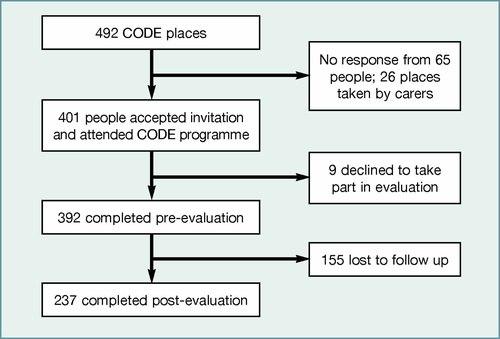下载PDF
{"title":"面向2型糖尿病患者的社区糖尿病教育(CODE)项目的有效性","authors":"A Clarke SRN, HDipDNS, MSc, PhD","doi":"10.1002/edn.188","DOIUrl":null,"url":null,"abstract":"<p>Evaluation is an essential component of structured diabetes education with most established programmes showing positive effects at group level. However, evaluation of post-educational intervention outcomes is dependent on the participant completing the programme. There is, currently, little research into the psychological or demographic attributes of non-attendees for post-educational intervention evaluation.</p><p>This study aimed to use the evaluation of a structured diabetes education programme in order to explore the characteristics of participants and determine if any association existed between personal characteristics and benefits of attendance and/or non-attendance for post-programme evaluation.</p><p>Using a convenience sample of people, a pre-post research design was employed to identify the psychological characteristics of people who benefit from and those who fail to complete an educational intervention programme for type 2 diabetes. The sample consisted of valid responses from 392 (98%, n=401) participants attending the Community Orientated Diabetes Education (CODE) programme, a structured diabetes education programme delivered to people with type 2 diabetes in the Republic of Ireland. The programme is based on an empowering philosophy with the main outcome measurement being diabetes-related empowerment, quality of life (QOL), knowledge, weight and biomedical markers.</p><p>In all, 237 (60%) completed the post-programme evaluation and demonstrated positive outcomes in empowerment, QOL and knowledge at group level but these were not sustained at individual level. However, over one-third of participants did not attend for post-evaluation and these were more likely to be younger and report poorer QOL.</p><p>The findings indicate the need to evaluate change at an individual level and to target younger people to retain their attendance for the full educational intervention. Copyright © 2011 FEND. Published by John Wiley & Sons, Ltd.</p>","PeriodicalId":100496,"journal":{"name":"European Diabetes Nursing","volume":"8 3","pages":"94-99a"},"PeriodicalIF":0.0000,"publicationDate":"2011-11-28","publicationTypes":"Journal Article","fieldsOfStudy":null,"isOpenAccess":false,"openAccessPdf":"https://sci-hub-pdf.com/10.1002/edn.188","citationCount":"9","resultStr":"{\"title\":\"Effectiveness of a community orientated diabetes education (CODE) programme for people with type 2 diabetes\",\"authors\":\"A Clarke SRN, HDipDNS, MSc, PhD\",\"doi\":\"10.1002/edn.188\",\"DOIUrl\":null,\"url\":null,\"abstract\":\"<p>Evaluation is an essential component of structured diabetes education with most established programmes showing positive effects at group level. However, evaluation of post-educational intervention outcomes is dependent on the participant completing the programme. There is, currently, little research into the psychological or demographic attributes of non-attendees for post-educational intervention evaluation.</p><p>This study aimed to use the evaluation of a structured diabetes education programme in order to explore the characteristics of participants and determine if any association existed between personal characteristics and benefits of attendance and/or non-attendance for post-programme evaluation.</p><p>Using a convenience sample of people, a pre-post research design was employed to identify the psychological characteristics of people who benefit from and those who fail to complete an educational intervention programme for type 2 diabetes. The sample consisted of valid responses from 392 (98%, n=401) participants attending the Community Orientated Diabetes Education (CODE) programme, a structured diabetes education programme delivered to people with type 2 diabetes in the Republic of Ireland. The programme is based on an empowering philosophy with the main outcome measurement being diabetes-related empowerment, quality of life (QOL), knowledge, weight and biomedical markers.</p><p>In all, 237 (60%) completed the post-programme evaluation and demonstrated positive outcomes in empowerment, QOL and knowledge at group level but these were not sustained at individual level. However, over one-third of participants did not attend for post-evaluation and these were more likely to be younger and report poorer QOL.</p><p>The findings indicate the need to evaluate change at an individual level and to target younger people to retain their attendance for the full educational intervention. Copyright © 2011 FEND. Published by John Wiley & Sons, Ltd.</p>\",\"PeriodicalId\":100496,\"journal\":{\"name\":\"European Diabetes Nursing\",\"volume\":\"8 3\",\"pages\":\"94-99a\"},\"PeriodicalIF\":0.0000,\"publicationDate\":\"2011-11-28\",\"publicationTypes\":\"Journal Article\",\"fieldsOfStudy\":null,\"isOpenAccess\":false,\"openAccessPdf\":\"https://sci-hub-pdf.com/10.1002/edn.188\",\"citationCount\":\"9\",\"resultStr\":null,\"platform\":\"Semanticscholar\",\"paperid\":null,\"PeriodicalName\":\"European Diabetes Nursing\",\"FirstCategoryId\":\"1085\",\"ListUrlMain\":\"https://onlinelibrary.wiley.com/doi/10.1002/edn.188\",\"RegionNum\":0,\"RegionCategory\":null,\"ArticlePicture\":[],\"TitleCN\":null,\"AbstractTextCN\":null,\"PMCID\":null,\"EPubDate\":\"\",\"PubModel\":\"\",\"JCR\":\"\",\"JCRName\":\"\",\"Score\":null,\"Total\":0}","platform":"Semanticscholar","paperid":null,"PeriodicalName":"European Diabetes Nursing","FirstCategoryId":"1085","ListUrlMain":"https://onlinelibrary.wiley.com/doi/10.1002/edn.188","RegionNum":0,"RegionCategory":null,"ArticlePicture":[],"TitleCN":null,"AbstractTextCN":null,"PMCID":null,"EPubDate":"","PubModel":"","JCR":"","JCRName":"","Score":null,"Total":0}
引用次数: 9
引用
批量引用
Effectiveness of a community orientated diabetes education (CODE) programme for people with type 2 diabetes
Evaluation is an essential component of structured diabetes education with most established programmes showing positive effects at group level. However, evaluation of post-educational intervention outcomes is dependent on the participant completing the programme. There is, currently, little research into the psychological or demographic attributes of non-attendees for post-educational intervention evaluation.
This study aimed to use the evaluation of a structured diabetes education programme in order to explore the characteristics of participants and determine if any association existed between personal characteristics and benefits of attendance and/or non-attendance for post-programme evaluation.
Using a convenience sample of people, a pre-post research design was employed to identify the psychological characteristics of people who benefit from and those who fail to complete an educational intervention programme for type 2 diabetes. The sample consisted of valid responses from 392 (98%, n=401) participants attending the Community Orientated Diabetes Education (CODE) programme, a structured diabetes education programme delivered to people with type 2 diabetes in the Republic of Ireland. The programme is based on an empowering philosophy with the main outcome measurement being diabetes-related empowerment, quality of life (QOL), knowledge, weight and biomedical markers.
In all, 237 (60%) completed the post-programme evaluation and demonstrated positive outcomes in empowerment, QOL and knowledge at group level but these were not sustained at individual level. However, over one-third of participants did not attend for post-evaluation and these were more likely to be younger and report poorer QOL.
The findings indicate the need to evaluate change at an individual level and to target younger people to retain their attendance for the full educational intervention. Copyright © 2011 FEND. Published by John Wiley & Sons, Ltd.


 求助内容:
求助内容: 应助结果提醒方式:
应助结果提醒方式:


